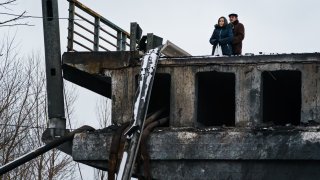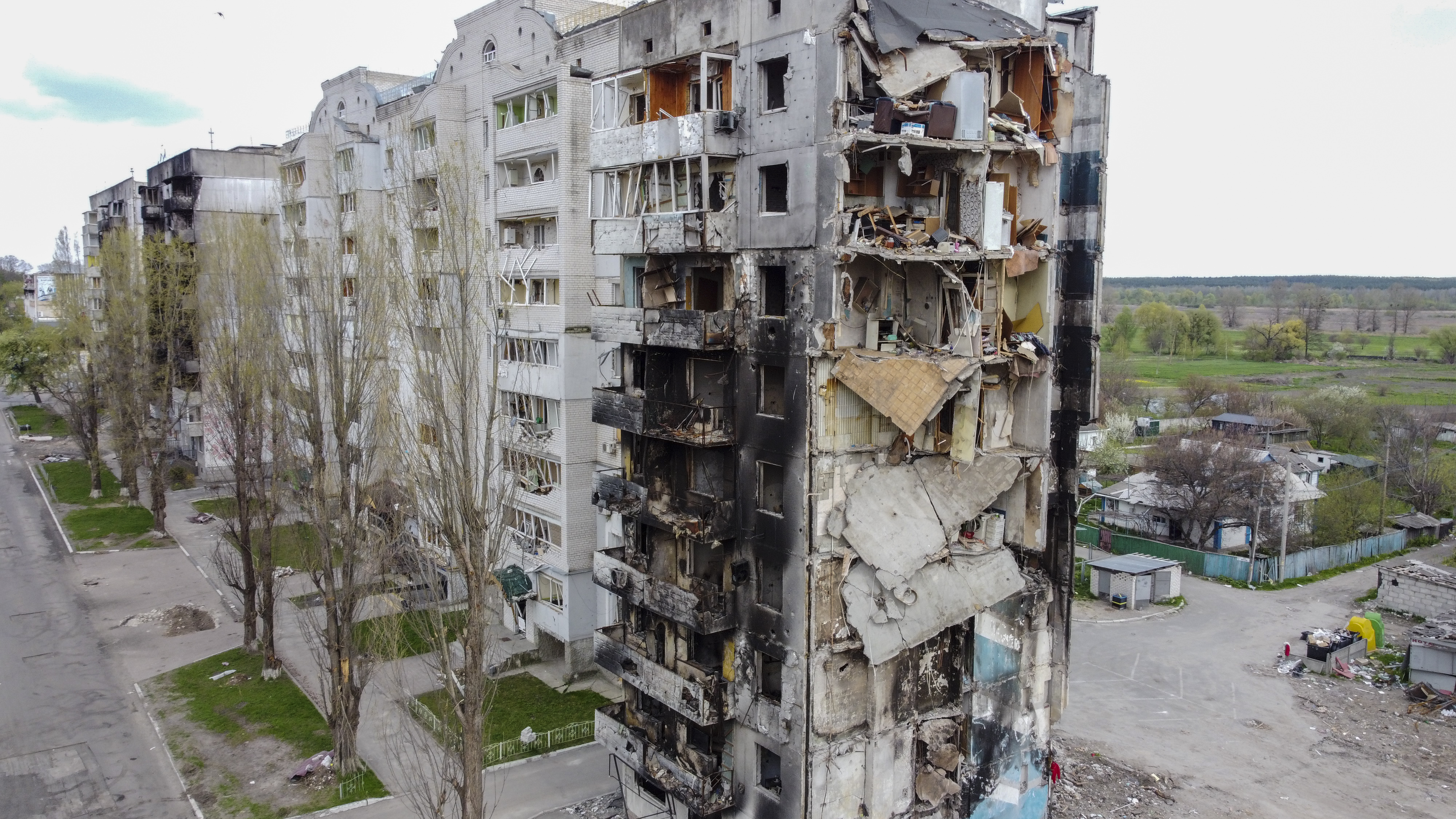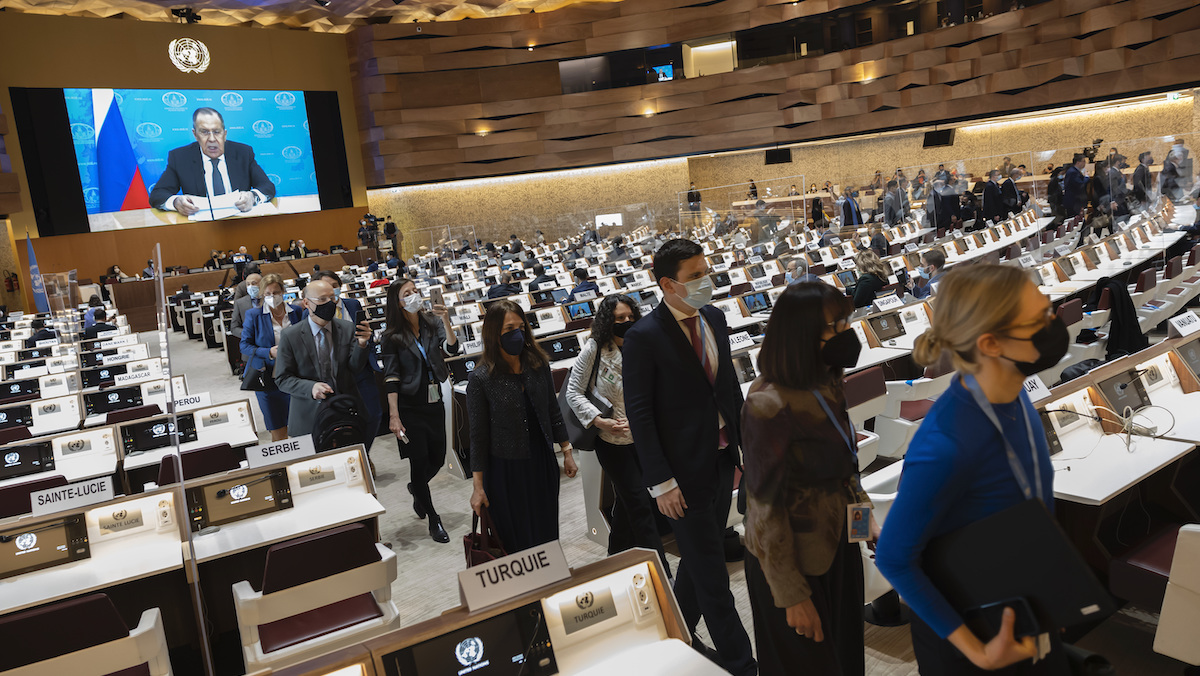
Russian forces escalated their attacks on crowded urban areas Tuesday in what Ukraine’s leader called a blatant campaign of terror, while U.S. President Joe Biden vowed to make his Russian counterpart “pay a price” for the invasion.
“Nobody will forgive. Nobody will forget,” Ukraine’s President Volodymyr Zelenskyy vowed after the bloodshed on the central square in Kharkiv, the country’s second-largest city, and the bombing of a TV tower in the capital.
Biden used his first State of the Union address to highlight the resolve of a reinvigorated Western alliance that has worked to rearm the Ukrainian military and adopt tough sanctions, which he said have left Russian President Vladimir Putin ”isolated in the world more than he has ever been.”
“Throughout our history we’ve learned this lesson — when dictators do not pay a price for their aggression, they cause more chaos,” Biden said. “They keep moving. And the costs and threats to America and the world keep rising.”
Feeling out of the loop? We'll catch you up on the Chicago news you need to know. Sign up for the weekly Chicago Catch-Up newsletter here.
Biden devoted the first 12 minutes of his Tuesday evening address to Ukraine, with lawmakers of both parties repeatedly rising to their feet and applauding as he praised the bravery of Ukraine’s people and condemned Putin’s assault.
As Biden spoke, a 40-mile (64-kilometer) convoy of hundreds of Russian tanks and other vehicles advanced slowly on Kyiv, the capital city of nearly 3 million people, in what the West feared was a bid by Putin to topple the government and install a Kremlin-friendly regime.
The invading forces also pressed their assault on other towns and cities, including the strategic ports of Odesa and Mariupol in the south.
Day 6 of the biggest ground war in Europe since World War II found Russia increasingly isolated, beset by the sanctions that have thrown its economy into turmoil and left the country practically friendless, apart from a few nations like China, Belarus and North Korea.
As the fighting in Ukraine raged, the death toll remained unclear. One senior Western intelligence official estimated that more than 5,000 Russian soldiers had been captured or killed. Ukraine gave no overall estimate of troop losses.
The U.N. human rights office said it has recorded 136 civilian deaths. The real toll is believed to be far higher.
Britain’s Defense Ministry said it had seen an increase in Russian air and artillery strikes on populated urban areas over the past two days. It also said three cities — Kharkiv, Kherson and Mariupol — were encircled by Russian forces.
Many military experts worry that Russia may be shifting tactics. Moscow’s strategy in Chechnya and Syria was to use artillery and air bombardments to pulverize cities and crush fighters’ resolve.
Ukrainian authorities said five people were killed in the attack on the TV tower, which is a couple of miles from central Kyiv and a short walk from numerous apartment buildings. A TV control room and power substation were hit, and at least some Ukrainian channels briefly stopped broadcasting, officials said.
The bombing came after Russia announced it would target transmission facilities used by Ukraine’s intelligence agency. It urged people living near such places to leave their homes.
Zelenskyy’s office also reported a powerful missile attack on the site of the Babi Yar Holocaust memorial, near the tower. A spokesman for the memorial said a Jewish cemetery at the site, where Nazi occupiers killed more than 33,000 Jews over two days in 1941, was damaged, but the extent would not be clear until daylight.
In Kharkiv, with a population of about 1.5 million, at least six people were killed when the region's Soviet-era administrative building on Freedom Square was hit with what was believed to be a missile.
The Slovenian Foreign Ministry said its consulate in Kharkiv, located in another large building on the square, was destroyed in the attack. The entrance to the consulate was between a jewelry store and a bank.
The attack on Freedom Square — Ukraine’s largest plaza, and the nucleus of public life in the city — was seen by many Ukrainians as brazen evidence that the Russian invasion wasn’t just about hitting military targets but also about breaking their spirit.
The bombardment blew out windows and walls of buildings that ring the massive square, which was piled high with debris and dust. Inside one building, chunks of plaster were scattered, and doors, ripped from their hinges, lay across hallways.
“People are under the ruins. We have pulled out bodies,” said Yevhen Vasylenko, an emergency official.
Zelenskyy pronounced the attack on the square “frank, undisguised terror” and a war crime. “This is state terrorism of the Russian Federation,” he said.
In an emotional appeal to the European Parliament later, Zelenskyy said: “We are fighting also to be equal members of Europe. I believe that today we are showing everybody that is what we are."
Another Russian airstrike hit a residential area near a hospital in the city of Zhytomyr, Mayor Serih Sukhomlin said in a Facebook video. Ukraine’s emergency services said the Tuesday's strike killed at least two people, set three homes on fire and broke the windows in the hospital. About 85 miles (140 kilometers) west of Kyiv, Zhytomyr is the home of the elite 95th Air Assault Brigade, which may have been the intended target.
Zelenskyy said 16 children had been killed around Ukraine on Monday, and he mocked Russia's claim that it is going after only military targets.
“Where are the children? What kind of military factories do they work at? What tanks are they going at?" Zelenskyy said.
Human Rights Watch said it documented a cluster bomb attack outside a hospital in Ukraine’s east in recent days. Local residents also reported the use of such weapons in Kharkiv and the village of Kiyanka, The Kremlin denied using cluster bombs.
Cluster bombs shoot smaller “bomblets” over a large area, many of which fail to explode until long after they’ve been dropped. If their use in Ukraine is confirmed, that would represent a new level of brutality in the war and could lead to even further isolation of Russia.
The first talks between Russia and Ukraine since the invasion were held Monday, but ended with only an agreement to talk again. On Tuesday, though, Zelenskyy said Russia should stop bombing first.
“As for dialogue, I think yes, but stop bombarding people first and start negotiating afterwards,“ he told CNN.
Moscow made new threats of escalation, days after raising the specter of nuclear war. A top Kremlin official warned that the West's “economic war” against Russia could turn into a “real one.”
More Russia-Ukraine Coverage
Inside Russia, a top radio station critical of the Kremlin was taken off the air after authorities threatened to shut it down over its coverage of the invasion. Among other things, the Kremlin is not allowing the fighting to be referred to as an “invasion” or “war.”
Roughly 660,000 people have fled Ukraine, and countless others have taken shelter underground. Bomb damage has left hundreds of thousands of families without drinking water, U.N. humanitarian coordinator Martin Griffiths said.
“It is a nightmare, and it seizes you from the inside very strongly. This cannot be explained with words,” said Kharkiv resident Ekaterina Babenko, taking shelter in a basement with neighbors for a fifth straight day. “We have small children, elderly people, and frankly speaking it is very frightening.”
A Ukrainian military official said Belarusian troops joined the war Tuesday in the Chernihiv region in the north, without providing details. But just before that, Belarusian President Alexander Lukashenko said his country had no plans to join the fight.
As for the Russians' advance on the capital, the leading edge of the convoy was 17 miles (25 kilometers) from the center of the city, according to satellite imagery from Maxar Technologies.
A senior U.S. defense official said that Russia's military progress — including by the massive convoy — has slowed, plagued by logistical and supply problems. Some Russian military columns have run out of gas and food, the official said, and morale has suffered as a result.
Overall, the Russian military has been stalled by fierce resistance on the ground and a surprising inability to completely dominate Ukraine’s airspace.
The immense convoy, with vehicles packed together along narrow roads, would seemingly be “a big fat target” for Ukrainian forces, the senior Western intelligence official said on condition of anonymity.
“But it also shows you that the Russians feel pretty comfortable being out in the open in these concentrations because they feel that they’re not going to come under air attack or rocket or missile attack,” the official said.
Ukrainians have used whatever they had to try to stop the Russian advance. On a highway between Odesa and Mykolaiv in southern Ukraine, residents piled tractor tires filled with sand and topped with sandbags to block convoys.
Click here for complete coverage of the crisis in Ukraine.



